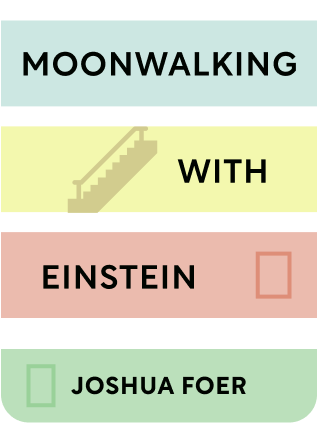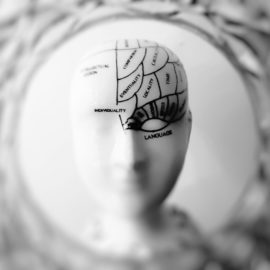

This article is an excerpt from the Shortform summary of "Moonwalking With Einstein" by Joshua Foer. Shortform has the world's best summaries of books you should be reading.
Like this article? Sign up for a free trial here .
Who us Joshua Foer in Moonwalking With Einstein? What did Foer achieve, and how did he do it?
Joshua Foer in Moonwalking with Einstein is an author and mnemonist who won the 2006 US Memory Championships. Joshua Foer was a journalist who reported on the memory championships. He was fascinated by the contest, and set out to learn everything he could about memory—eventually returning to the Memory Championships as a contestant.
Keep reading to find out more about Joshua Foer in Moonwalking With Einstein, including everything you need to know about his memory training.
Joshua Foer: Moonwalking With Einstein and Memory Training
In 2005, journalist Joshua Foer (Josh) reported on the US Memory Championships. Many of the competitors he interviewed told him that they weren’t geniuses. They simply used memory techniques, and the techniques were so accessible anyone could learn them—including Josh. Grand Master of Memory Ed Cooke offered to train Josh in the memory arts and Josh, considering it a good journalistic experiment, agreed.
Over the next year, Josh learned the memory arts from Ed but also studied memory more broadly, interviewing famous mnemonists, savants, scientists, and researchers. Moonwalking with Einstein is a compilation of everything he learned and the story of his year training to be a mnemonist, or mental athlete. Read about Joshua Foer’s Moonwalking with Einstein journey.
Memory Training
Josh started his memory training by memorizing Ed’s to-do list using the method of loci. Then, he memorized some of the to-do list post-it notes stuck on his walls, such as to get his car inspected or to find books on specific subjects. He tried to use his memory in his daily life rather than simply practicing for the specific challenges he’d be facing in the national championship. He memorized phone numbers and his credit card numbers.
Josh tried poetry. He first tried “Jabberwocky,” which is made up almost completely of nonsense words. He didn’t know how to make images out of not only abstract but unreal words such as “brillig” and ended up just memorizing by rote.
Cards were Josh’s strongest event because he used an advanced PAO system. At a certain point, however, he hit a plateau and couldn’t get his speed any faster. He consulted Ericsson, who advised him to practice deliberately. Josh did this by timing himself with a metronome and forcing himself to go faster than his usual pace. Whenever he came to a card that gave him trouble, he took the time to analyze why.
Josh logged his progress on a spreadsheet and consulted regularly with Ed. When Josh found himself getting bored by his training and easily distracted by more interesting things going on nearby, Ed suggested he try earmuffs and pinhole glasses to minimize distractions.
Ed’s Birthday Party
Joshua Foer in Moonwalking with Einstein returned to Oxford to work with Ed in person. He timed the trip so he could attend Ed’s twenty-fifth birthday. Ed’s party had some mnemonist-specific elements—it was held in a barn that Ed set up like a memory palace (fabric dividers between sections, a room full of balloons, and so on) so the party would be memorable. He also wanted to mix social circles, so everyone came in a costume that hid their face. Finally, there was a card memorizing contest between Ben Pridmore and Lukas, and after Lukas was deemed too drunk, Ben and Ed.
After the party, Josh got some more tips from Ed. Josh kept mixing up the seven of spades and diamonds, whose images were both of people riding. The spades were a jockey on a racehorse, and the diamonds were Lance Armstrong on a bike. Ed gave him two options: focus on a detail or change the image. Josh decided to focus on Lance Armstrong’s sunglasses and changed the seven of spades to a midget riding a pony while wearing a sombrero.
Josh also found that he’d forget his card images, for which the solution was practice. He had to spend time with each character, considering everything from their taste to their clothes to how they felt about violence. Then, he imagined them doing everyday things to get used to their presence in any situation. He also had some trouble because he’d put family members into his PAO, so Ed recommended he choose other people instead.
Around a Month Before the Championship
In February 2006, Josh’s practice scores started to get competitive—he was getting close to the numbers previous champions had achieved and once even managed to do a deck of cards one second faster than the record in the US. However, Ed warned Josh that he’d likely do at least 20% worse at the actual championship when the pressure was on. Regardless, Joshua Foer in Moonwalking in Einstein decided to compete.
The 2006 championship included a new event that neither Ed nor the competitors had seen before. It was called “Three Strikes and You’re Out of the Tea Party” and involved remembering details about five strangers—an event with real-world applications.
For this event, Josh and Ed came up with a system that involved creating five memory palaces, and assigning one to each of the strangers. Each person’s assigned palace would contain the same piece of information: for example, the image corresponding to the address of each stranger would go in the kitchen of that stranger’s palace.
Three weeks before the championship, Ed told Josh to stop practicing the other events and focus on the tea party. Josh got his friends and family to test him.
A week before the championship, Josh stopped practicing. He mentally cleared his memory palaces so that no leftover images would get in his way during the competition. (Some of the most intense mental athletes won’t even talk to anyone in the three days before a contest, lest someone create a distracting association.)
Ed was supposed to have been at the competition with Josh, but Ed got an opportunity to do research in Australia, so he was no longer able to attend.
The 2006 US Memory Championship
Josh had been telling everyone the contest was just a whim, or just a journalistic experiment, but he really wanted to win. He worried competitors would come up with new mnemonic techniques, and he was particularly worried about Maurice Stoll. The night before the competition, Josh couldn’t sleep and had strange dreams about his images.
When Josh arrived at the competition, the first people he ran into were Ben, who would be spectating, not competing, and Maurice. Both of them told Josh how important it was to get a good sleep before a competition. Josh was rattled.
Returning to Anders Ericsson’s Lab
After the world championship, Josh returned to Ericsson’s lab to be retested. He retook the same tests and some new ones. He’d improved his digit span test to 18 and he could remember more poetry, names, and trivia.
The digit span test is the standard for working memory, but Josh didn’t find that his working memory had doubled. He still didn’t remember things he couldn’t put into a memory palace, and he didn’t remember things he hadn’t been paying attention to in the first place. Only a few days after the world championship, he forgot he’d driven to a restaurant and took the subway home, leaving his car behind.
Ericsson thought Josh was unusual in that he committed to the practice required to improve his memory, but any motivated college student could have achieved the same results.
Joshua Foer’s Moonwalking With Einstein Final Reflections
Josh thought he could further improve at the memory arts if he put more time into them, but he ultimately decided to stop competing. A fellow competitor acknowledged that Josh could probably find better ways to spend his time than training intensely for another year.
Josh never got rid of his notebook or Dictaphone, and he only memorizes things if he doesn’t have a phone or pen handy. The memory techniques worked for him, but he found they weren’t very necessary in his day-to-day life in the modern world.
Josh found that the most valuable thing he learned about memory is that it shapes our characters—we see the world and interact with it based on what and how we remember. Memory is about finding connections between things, creating new ideas, and being mindful—you can only remember things you were paying attention to in the first place. External memories can keep track of schedules or groceries, but they don’t make creative connections the way people’s memories do. An external memory doesn’t create art or jokes. Our internal memories are at the core of what makes us human.
Joshua Foer’s Moonwalking With Einstein offers a fascinating look into the science of memory, as well as the community who makes memorization their main focus. Foer’s insights on memory can help us improve our own memories, too.

———End of Preview———
Like what you just read? Read the rest of the world's best summary of Joshua Foer's "Moonwalking With Einstein" at Shortform .
Here's what you'll find in our full Moonwalking With Einstein summary :
- The memory techniques that took the author from novice to US memory champion in one year
- The 6 key types of memory we use everyday
- Why memory isn't just genetic, and how you can improve your memory with the right techniques






